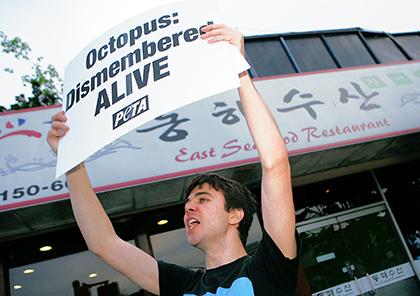By Connor Adams Sheets
A clash of cultures arrived outside two Flushing restaurants last Thursday evening as People for the Ethical Treatment of Animals members protested the Korean culinary tradition of eating live octopus and the techniques sometimes employed when doing so.
The practice caught the attention of PETA members in recent weeks after the animal rights organization received numerous complaints about YouTube videos depicting diners eating squirming octopus, known as “sannakji,” at East Seafood Restaurant on Northern Boulevard and Sik Gaek on Crocheron Avenue.
An article by TimesLedger Newspapers restaurant critic Suzanne Parker detailing her experience eating live octopus tentacles at East Seafood was among the first news item to raise awareness about the practice.
The point of contention is the way the animals are treated prior to their ingestion at the two eateries, which Ryan Huling, PETA’s senior college campaign coordinator, said are the only two they know of in the United States that engage in the practice, which is popular in Korea.
Huling said that while the animals are still alive, the restaurants torture and abuse them in ways that are unnecessary and cruel.
“PETA has been flooded with complaints, e-mails and phone calls from concerned New Yorkers about octopi having their legs cut off with scissors and then being served still squirming and terrified with their hearts still beating even as they’re eaten at the table. It’s pretty horrific,” he said. “People have been particularly outraged because octopi are very intelligent and complex animals.”
But Will Son, a chef at Eastern Seafood Restaurant, argued through a translator that the practice is misunderstood and emphasized that the restaurant has no plan to remove it from the menu.
“It’s a delicacy if you will. It’s not for everyone. Is it cruel? I can see where they’re coming from, but it’s part of the food chain,” he explained. “The reality is this: We all think it’s normal to eat our variety of foods that we eat, which is veggies, meat and liquid. What you choose to eat is your preference. What you choose to eat doesn’t make you any more right or wrong.”
Parker agreed with Son, saying she will probably not eat raw octopus again, but that she thinks there is nothing wrong with doing so.
“Octopi in the wild get eaten alive all the time, so I don’t really see what the big deal is,” she said. “I think we should respect other people’s cultural traditions, and if we don’t want to participate in them, I don’t think we should be all up in arms over something so silly.”
PETA members disagree and last week about two dozen of them stood in front of the restaurants waving signs with slogans like “Octopus: Dismembered ALIVE” and repeatedly chanting: “There’s no excuse for animal abuse.”
Eva Armfield, a veterinarian who said she has been a vegetarian since first viewing PETA advertisements in junior high school, drove to Flushing from her home in Ronkonkoma, L.I., to protest a tradition she sees as torture.
“They do it for the shock value and the entertainment,” she said. “If people are going to eat seafood, they should kill it in a humane way.”
The organization is calling on Queens District Attorney Richard Brown’s office to file charges of cruelty to animals against any restaurant serving live animals.
Reach reporter Connor Adams Sheets by e-mail at csheets@cnglocal.com or by phone at 718-260-4538.


































